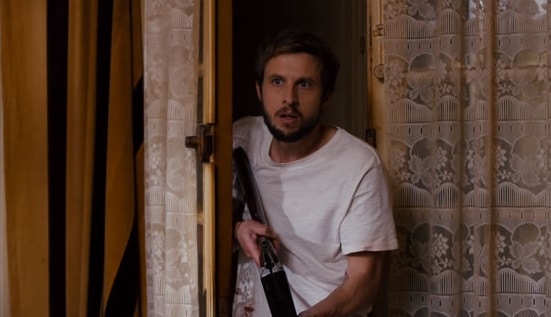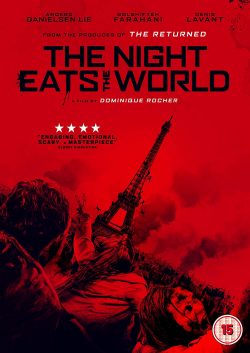 Zombies, as anyone who’s been following the trends of horror cinema so far this century will be aware, came dangerously close to over-saturation in the past decade. (I’d say ‘done to death,’ only… y’know.) However, the mid-2000s living dead frenzy in the wake of Shaun of the Dead, The Walking Dead, World War Z etc. has eased off significantly in recent years, so perhaps the time is right for a new movie that revisits the concept with fresh eyes. One new film that sets out to do just that is The Night Eats The World, an adaptation of Pit Agarmen’s novel La Nuit a Dévoré Le Monde from director Dominic Rocher. As might be apparent from the title of the novel and the names of those involved, this is a French film, and intruigingly this particular production went to the trouble of assembling two distinct cuts in both French and English (I saw the latter). On first hearing such a thing, it’s easy to wonder why they would bother going to so much trouble, but once things are in motion it becomes apparent that it might not have been too great a stretch, as there really isn’t a great deal of dialogue in this film. This is because, in the tradition of the novel which might easily be declared the birthplace of the modern zombie genre, Richard Matheson’s I Am Legend*, The Night Eats The World is told entirely from the viewpoint of a single man who, as far as he knows, might be the only human left alive in the wake of a living dead apocalypse.
Zombies, as anyone who’s been following the trends of horror cinema so far this century will be aware, came dangerously close to over-saturation in the past decade. (I’d say ‘done to death,’ only… y’know.) However, the mid-2000s living dead frenzy in the wake of Shaun of the Dead, The Walking Dead, World War Z etc. has eased off significantly in recent years, so perhaps the time is right for a new movie that revisits the concept with fresh eyes. One new film that sets out to do just that is The Night Eats The World, an adaptation of Pit Agarmen’s novel La Nuit a Dévoré Le Monde from director Dominic Rocher. As might be apparent from the title of the novel and the names of those involved, this is a French film, and intruigingly this particular production went to the trouble of assembling two distinct cuts in both French and English (I saw the latter). On first hearing such a thing, it’s easy to wonder why they would bother going to so much trouble, but once things are in motion it becomes apparent that it might not have been too great a stretch, as there really isn’t a great deal of dialogue in this film. This is because, in the tradition of the novel which might easily be declared the birthplace of the modern zombie genre, Richard Matheson’s I Am Legend*, The Night Eats The World is told entirely from the viewpoint of a single man who, as far as he knows, might be the only human left alive in the wake of a living dead apocalypse.
That man is Sam (Anders Danielsen Lie), who we meet as he arrives at what unbeknownst to all present is an end of the world party at his ex-girlfriend’s new apartment in Paris. He’s come simply to pick up some of his old stuff, not knowing that anyone else would be there; uncomfortable among the crowds, he winds up locking himself in the office, where he winds up nodding off. The next morning he awakes to an alarming sight: the apartment is empty of people, but covered in blood and detritus. Soon, Sam comes face to face with the shocking truth that zombies have overrun the city, maybe even the world. However, rather than losing his shit, Sam buckles down and sets about ensuring his own survival. He cleans and secures the apartment, arms himself, then sets about exploring the other apartments and salvaging whatever he can find, most importantly canned food. Curiously, Sam soon gets quite comfortable with this simple, solitary lifestyle – but how long can anyone stay alone in a single apartment, with no sign of human life anywhere, before it starts to take its toll?
 Again, if you’ve read I Am Legend or seen any of its film adaptations (including Vincent Price’s The Last Man on Earth and Charlton Heston’s The Omega Man, as well as the comparatively recent Will Smith movie), that’s the most obvious immediate frame of reference here, as the focus is primarily on one man facing the very real possibility that he’s the last of his kind. However, where Matheson cast his lead as a scientist determined to find some kind of cure to the living dead problem, The Night Eats The World centres on a totally average man with no discernible profession and no illusions of being able to fix anything, who – for the early half of the action, at least – seems surprisingly okay with that. We might be left wondering why he doesn’t seem to make any attempts whatsoever to reach the outside world, or look for updates on the TV even though he still seems to have power (this is a niggling problem that doesn’t really go away; witness Sam taking a hot shower, yet gathering rainwater on the roof in buckets). However, Sam’s apparent acceptance of the situation is what makes The Night Eats The World stand apart. We’re so used to zombie flicks that immediately plunge their protagonists into abject despair, or trigger a major fight-or-flight impulse, that it’s kind of a refreshing change to see a zombie movie survivor who doesn’t seem too freaked out by it all. It does, in a curious way, give pause for thought as to whether, on some misanthropic level, we might appreciate being free from the rest of humanity. But of course, Sam doesn’t stay this way forever, and by the latter half of the film the solitude and anxiety starts eating away at him.
Again, if you’ve read I Am Legend or seen any of its film adaptations (including Vincent Price’s The Last Man on Earth and Charlton Heston’s The Omega Man, as well as the comparatively recent Will Smith movie), that’s the most obvious immediate frame of reference here, as the focus is primarily on one man facing the very real possibility that he’s the last of his kind. However, where Matheson cast his lead as a scientist determined to find some kind of cure to the living dead problem, The Night Eats The World centres on a totally average man with no discernible profession and no illusions of being able to fix anything, who – for the early half of the action, at least – seems surprisingly okay with that. We might be left wondering why he doesn’t seem to make any attempts whatsoever to reach the outside world, or look for updates on the TV even though he still seems to have power (this is a niggling problem that doesn’t really go away; witness Sam taking a hot shower, yet gathering rainwater on the roof in buckets). However, Sam’s apparent acceptance of the situation is what makes The Night Eats The World stand apart. We’re so used to zombie flicks that immediately plunge their protagonists into abject despair, or trigger a major fight-or-flight impulse, that it’s kind of a refreshing change to see a zombie movie survivor who doesn’t seem too freaked out by it all. It does, in a curious way, give pause for thought as to whether, on some misanthropic level, we might appreciate being free from the rest of humanity. But of course, Sam doesn’t stay this way forever, and by the latter half of the film the solitude and anxiety starts eating away at him.
One thing that’s particularly bold about Rocher’s film (although, having not read Agermen’s novel, I couldn’t say whether it’s the same there) is that we learn very little about Sam throughout. Usually any film or story that centres so entirely on a single protagonist feels the need to give us plenty of backstory, but that doesn’t happen here. We gather that Sam’s keen on music – a big part of his routine is creating complex percussion arrangements with household objects, as well as hammering the skins on a borrowed drum kit – but otherwise we’re given very little detail on who he was before, or even his relationship with the ex we briefly meet at the start. To an extent this works, but I suspect spending 90-odd minutes in the company of someone who’s such a blank page may prove trying for some viewers, who might struggle to find a reason to connect with this guy. Still, Sam does manage some minor social interactions, most notably with a zombie trapped in an elevator who effectively becomes his Wilson (i.e. the basketball from Cast Away)… and there’s more on that front, but I won’t get into that to avoid spoilers.
All in all, The Night Eats The World is hardly a major reinvention of the zombie genre, and I rather doubt it’ll find much of an audience beyond devotees of the subgenre. Even so, it’s confidently directed with a good balance of suspense and emotional realism, and has a strong lead performance from Anders Danielsen Lie, so it’s well worth giving a look.
The Night Eats The World is released to limited US cinemas and VOD on Friday the 13th of July, via Blue Fox Entertainment. UK audiences can catch it at London’s Arrow Video FrightFest on August Bank Holiday weekend, before Signature Entertainment release it to DVD on 27th August.
*Although I Am Legend’s antagonists are generally classed as vampires, George A Romero admitted that he was borrowing liberally from Matheson’s book on Night of the Living Dead.
